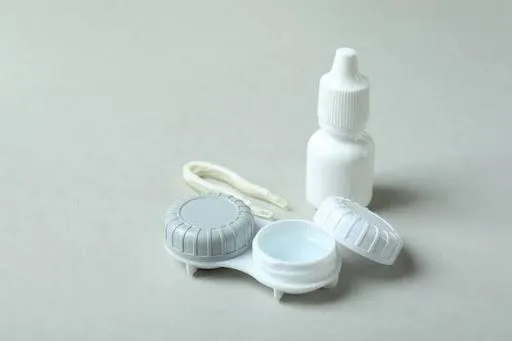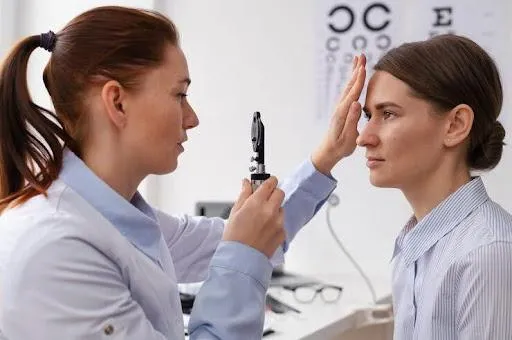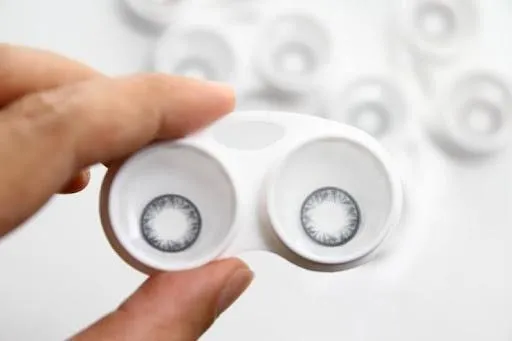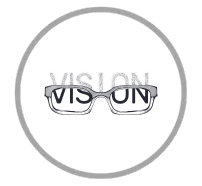Contact Lenses
Choosing the Right Contact Lenses
FSDAVCFEBFEVSDDVFSD
FSDAVCFEBFEVSDDVFSD
FSDAVCFEBFEVSDDVFSD
Lens Types and Functions
Soft, hard, and specialty contact lenses each cater to different eye needs and lifestyle factors. Soft lenses, popular for daily or monthly wear, provide comfort and ease of use. Rigid gas permeable (RGP) lenses offer sharp vision, especially for those with high prescriptions or astigmatism. Toric lenses are specifically designed to correct astigmatism, offering more stability and reduced blur. Multifocal lenses can help with presbyopia by offering seamless near-to-far correction.
Then there are scleral lenses—large, vaulting lenses ideal for people with keratoconus, dry eye, or irregular corneas. These sit on the sclera instead of the cornea, ensuring stability and comfort for patients with complex needs.
Soft, hard, and specialty contact lenses each cater to different eye needs and lifestyle factors. Soft lenses, popular for daily or monthly wear, provide comfort and ease of use. Rigid gas permeable (RGP) lenses offer sharp vision, especially for those with high prescriptions or astigmatism. Toric lenses are specifically designed to correct astigmatism, offering more stability and reduced blur. Multifocal lenses can help with presbyopia by offering seamless near-to-far correction.

Then there are scleral lenses—large, vaulting lenses ideal for people with keratoconus, dry eye, or irregular corneas. These sit on the sclera instead of the cornea, ensuring stability and comfort for patients with complex needs.

Soft to Speciality Contact Lens Options
Each contact lens category offers distinct benefits based on your eye health and vision goals. Soft lenses are the most popular choice for comfort, especially daily disposables, which lower the risk of infection and require minimal maintenance. Monthly lenses strike a balance between cost and convenience, provided users follow proper hygiene protocols to ensure safety and comfort.
For individuals with high astigmatism, toric lenses are the go-to correction option. Unlike soft lenses, toric lenses are weighted to maintain the correct orientation on the eye. RGP lenses—though less commonly used today—still provide excellent visual clarity, and many users appreciate their durability and crisp optics compared to soft lenses.
Multifocal lenses are ideal for those in their 40s and beyond, helping reduce the reliance on reading glasses. For patients with dry eyes or corneal irregularities, scleral lenses offer a custom fit and contain a fluid reservoir for hydration. Since they don’t touch the cornea directly, scleral lenses are often more comfortable for those with scarring or sensitivity. Patients unsure of the right lens type should consult their optometrist. At Kleinwood Vision, evaluations are personalized using advanced mapping technology to match lenses to your unique eye shape, lifestyle, and vision needs.
Understanding Common Eye Conditions and Symptoms

Some eye conditions dictate the type of contact lens that will work best. For example, astigmatism, caused by an irregular corneal shape, requires toric or RGP lenses to maintain proper orientation and visual clarity. Presbyopia, the age-related decline in near vision, is typically managed with multifocal or monovision lens setups to support both distance and close-up vision effectively.
Dry eye syndrome, often linked to extended screen time or certain medications, can make regular lenses uncomfortable.

In these cases, scleral lenses are beneficial as they provide both comfort and hydration. For more complex issues such as keratoconus or post-surgical corneal irregularities, scleral or hybrid lenses offer a more reliable fit and sharper vision. Kleinwood Vision specializes in identifying these nuanced conditions using advanced diagnostic tools, ensuring each patient is matched with the most suitable contact lens design for their unique needs.
Scleral lenses aren’t just for rare conditions—they can benefit a wide range of wearers. These lenses are ideal for people who have difficulty wearing traditional lenses due to comfort issues, severe dryness, or an irregular corneal shape. By vaulting over the cornea and resting on the less sensitive sclera, scleral lenses avoid direct contact with the cornea, eliminating much of the discomfort associated with standard lenses and offering a more stable, hydrating solution.
Patients recovering from corneal surgeries or dealing with complex eye diseases like Stevens-Johnson syndrome or Sjögren’s syndrome often find scleral lenses to be a game-changer. Even those with persistent contact lens intolerance frequently succeed with this option. Fittings for scleral lenses are more involved, requiring precise measurements and regular follow-ups. However, the payoff is significant: clear, stable, and comfortable vision. At Kleinwood Vision, our doctors custom-fit each scleral lens and make ongoing adjustments to ensure the best outcome for every patient.
Lens Fit and Comfort Matters
Lens fit is crucial not only for vision clarity but also for protecting the overall health of your eyes. A poorly fitted lens can lead to corneal abrasions, inflammation, or ongoing discomfort that discourages continued wear. In toric or multifocal lenses, even a slight misalignment can cause fluctuating vision, headaches, or eye strain—making precise fitting essential for both clarity and comfort.
At Kleinwood Vision, every contact lens fitting begins with advanced diagnostics like corneal topography and tear film evaluation. We assess factors such as eye curvature, blinking patterns, and screen time habits to find the best lens for your lifestyle. If comfort has been a problem with previous lenses, options like hybrid or scleral lenses may offer a more personalized solution. Customization is key—no two eyes are the same, and neither should their lenses be. Our approach ensures your contact lenses support both your vision and long-term eye health.
Contact Lens Pros and Cons Compared
Soft lenses offer comfort and ease of use, making them ideal for first-time wearers and people with stable prescriptions. However, they can dry out quickly and may not provide the sharpest vision for high refractive errors. RGP lenses deliver crisp optics and greater durability but require a longer adaptation period.
Toric lenses correct astigmatism but need precise alignment and regular replacement for clear vision. Multifocal lenses reduce dependence on reading glasses, though some users may experience ghosting or require time to adjust.
Soft lenses offer comfort and ease of use, making them ideal for first-time wearers and people with stable prescriptions. However, they can dry out quickly and may not provide the sharpest vision for high refractive errors. RGP lenses deliver crisp optics and greater durability but require a longer adaptation period.
Toric lenses correct astigmatism but need precise alignment and regular replacement for clear vision. Multifocal lenses reduce dependence on reading glasses, though some users may experience ghosting or require time to adjust.


Scleral lenses address multiple issues by providing hydration and comfort, especially for dry eyes or irregular corneas. They are more expensive and require a detailed fitting process. Choosing the right lens depends on your visual goals, comfort, and ocular health.
Choosing What’s Right for You
If you’re new to contact lenses or unsatisfied with your current lenses, a thorough consultation at Kleinwood Vision can make all the difference. During your visit, we assess not only your vision correction needs but also your overall eye health and lifestyle factors. Whether you lead an active lifestyle, spend significant time on digital devices, or have unique corneal conditions, our team carefully matches lens options to suit you. Younger patients with simple prescriptions may benefit from soft daily lenses, while older patients or those experiencing presbyopia often prefer multifocal lenses. For those suffering from chronic dry eye, scleral lenses provide superior comfort and hydration. There is no one-size-fits-all solution—your contact lenses should work seamlessly with your daily routine, not against it.
With recent advancements in lens materials and designs, even patients who were once told they were not good candidates for contact lenses now have viable options. Kleinwood Vision stays current with the latest lens technologies to ensure that no patient is left behind. Our team is committed to offering innovative solutions that improve both vision and comfort for all wearers, regardless of their individual challenges.
Routine follow-up appointments are essential to ensure ongoing comfort and eye health. Eye shape, prescription, and comfort levels can shift over time, so consistent evaluations are crucial for successful contact lens wear. At Kleinwood Vision, we prioritize patient education and personalized care, guiding you through every step of the contact lens journey to maintain clear, healthy vision for years to come.
What to Expect at Fitting
A contact lens fitting at Kleinwood Vision is more than just a simple trial—it’s a thorough and comprehensive process. We start by taking precise measurements of your cornea, carefully assessing your tear film, and evaluating your blinking patterns. If your eye shape or medical history suggests, we explore specialty lens options right from the beginning to find the best possible fit and comfort.
During the trial period, you’ll wear different lenses and provide feedback on comfort, clarity, and ease of handling. Your input allows us to fine-tune the final lens selection, ensuring optimal vision correction and promoting long-term eye health. We aim to make sure your lenses suit your unique needs perfectly.

A contact lens fitting at Kleinwood Vision is more than just a simple trial—it’s a thorough and comprehensive process. We start by taking precise measurements of your cornea, carefully assessing your tear film, and evaluating your blinking patterns. If your eye shape or medical history suggests, we explore specialty lens options right from the beginning to find the best possible fit and comfort.
During the trial period, you’ll wear different lenses and provide feedback on comfort, clarity, and ease of handling. Your input allows us to fine-tune the final lens selection, ensuring optimal vision correction and promoting long-term eye health. We aim to make sure your lenses suit your unique needs perfectly.
If you’re frequently on the move or prefer not to wear glasses, multifocal contacts offer more freedom and convenience. They provide clear vision at multiple distances without the need for switching glasses, making them ideal for active lifestyles.
Once your ideal lens type is confirmed, we provide detailed instructions on lens care, hygiene, and recommended wear schedules. Follow-up appointments are scheduled to monitor your progress and ensure continued success with your contact lenses.
Let Your Lenses Work for You
Contact lenses should enhance your vision and lifestyle—not cause discomfort or reduce clarity. At Kleinwood Vision, we believe that finding the right lenses is about more than just vision correction; it’s about achieving lasting comfort and ease throughout your daily routine. By exploring all options—from soft daily lenses to custom scleral fits—patients can discover solutions that feel natural and support overall eye health.
Our team is dedicated to providing personalized care tailored to your unique needs, whether you’re new to contact lenses or seeking alternatives after years of discomfort. With extensive expertise in specialty contact lenses, we ensure every patient receives a lens fit that feels right and promotes long-term eye health. Contact us today to get started. At Kleinwood Vision, your comfort and clear vision are always our highest priorities, and we guide you every step of the way toward the best solution for your lifestyle.

Contact Info
Hours of Operation
Mon - Fri | 9:00 AM - 5:00 PM
Sat - Sun | Closed
Holiday Hours: We are closed for the following holidays: New Years Day, Memorial Day, Independence Day, Labor Day, Thanksgiving Day, Christmas Day
© 2026 Kleinwood Vision. All rights Reserved.


